Hyundai Kona vs Mercedes C-Class Sedan – Performance, range & efficiency compared
Everyday use, family trips or long-distance drives – here’s where the differences show.
Discover whether Hyundai Kona or Mercedes C-Class Sedan fits your lifestyle better.
Costs and Efficiency:
Price and efficiency are key factors when choosing a car – and this is often where the real differences emerge.
Hyundai Kona has a decisively advantage in terms of price – it starts at 23100 £, while the Mercedes C-Class Sedan costs 41200 £. That’s a price difference of around 18109 £.
Fuel consumption also shows a difference: Mercedes C-Class Sedan manages with 1.60 L and is therefore significantly more efficient than the Hyundai Kona with 4.60 L. The difference is about 3 L per 100 km.
As for range, the Hyundai Kona performs clearly better – achieving up to 514 km, about 397 km more than the Mercedes C-Class Sedan.
Engine and Performance:
Under the bonnet, it becomes clear which model is tuned for sportiness and which one takes the lead when you hit the accelerator.
When it comes to engine power, the Mercedes C-Class Sedan has a convincingly edge – offering 680 HP compared to 218 HP. That’s roughly 462 HP more horsepower.
In acceleration from 0 to 100 km/h, the Mercedes C-Class Sedan is convincingly quicker – completing the sprint in 3.40 s, while the Hyundai Kona takes 7.80 s. That’s about 4.40 s faster.
In terms of top speed, the Mercedes C-Class Sedan performs clearly perceptible better – reaching 280 km/h, while the Hyundai Kona tops out at 210 km/h. The difference is around 70 km/h.
There’s also a difference in torque: Mercedes C-Class Sedan pulls clearly stronger with 1020 Nm compared to 265 Nm. That’s about 755 Nm difference.
Space and Everyday Use:
Cabin size, boot volume and payload all play a role in everyday practicality. Here, comfort and flexibility make the difference.
Both vehicles offer seating for 5 people.
In curb weight, Hyundai Kona is distinct lighter – 1370 kg compared to 1695 kg. The difference is around 325 kg.
In terms of boot space, the Hyundai Kona offers minimal more room – 466 L compared to 455 L. That’s a difference of about 11 L.
When it comes to payload, Mercedes C-Class Sedan a bit takes the win – 570 kg compared to 490 kg. That’s a difference of about 80 kg.
Who wins the race?
The Mercedes C-Class Sedan proves to be is largely superior and therefore becomes our DriveDuel Champion!
Mercedes C-Class Sedan is the better all-rounder in this comparison.
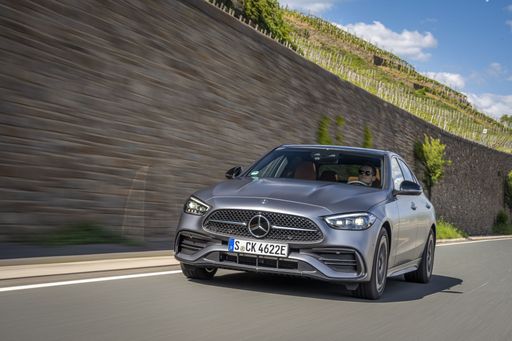 @ Mercedes-Benz Group Media
@ Mercedes-Benz Group Media
Mercedes C-Class Sedan
Hyundai Kona
The Hyundai Kona wears its personality on the outside with bold styling and sprightly handling that turns city driving into something a little more fun than a commute. It blends practical space, modern tech and sensible running costs into a compact, stylish package — a smart pick if you want flair without paying luxury prices.
details @ Hyundai Motor Company
@ Hyundai Motor Company
 @ Hyundai Motor Company
@ Hyundai Motor Company
 @ Hyundai Motor Company
@ Hyundai Motor Company
 @ Hyundai Motor Company
@ Hyundai Motor Company
Mercedes C-Class Sedan
The Mercedes C‑Class is the compact executive that dresses like it owns the boulevard, with an interior that blends modern elegance and plush comfort to make everyday driving feel unexpectedly special. On the road it pairs poise with a hint of cheeky agility, rewarding drivers who want refinement without forfeiting a touch of fun — and yes, it still looks great in the driveway.
details @ Mercedes-Benz Group Media
@ Mercedes-Benz Group Media
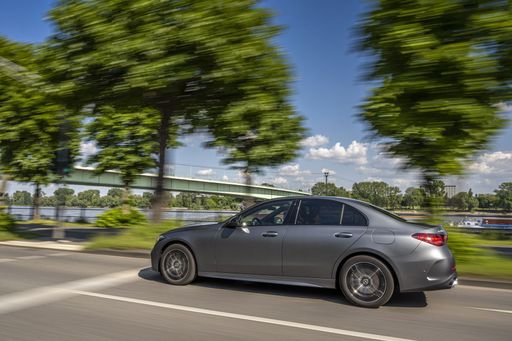 @ Mercedes-Benz Group Media
@ Mercedes-Benz Group Media
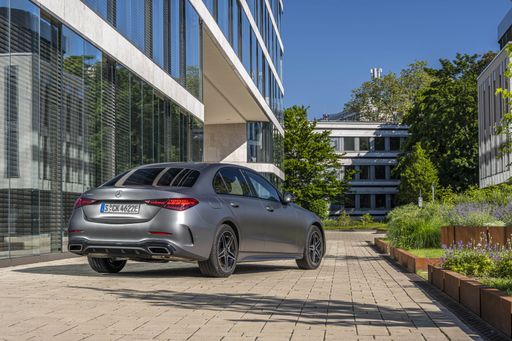 @ Mercedes-Benz Group Media
@ Mercedes-Benz Group Media
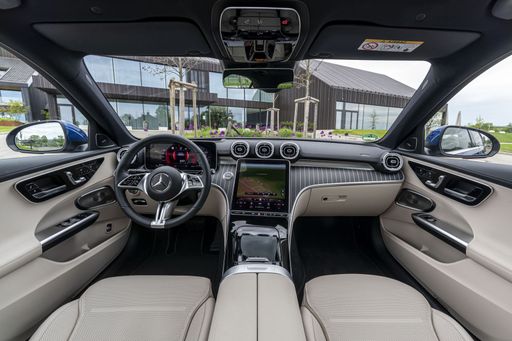 @ Mercedes-Benz Group Media
@ Mercedes-Benz Group Media
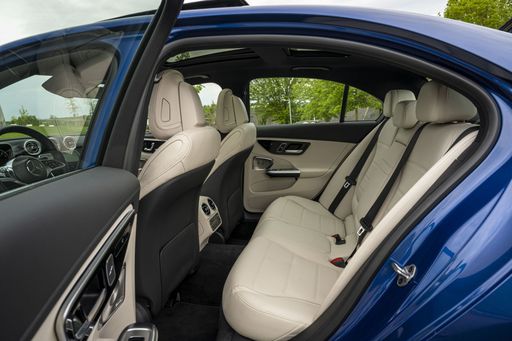 @ Mercedes-Benz Group Media
@ Mercedes-Benz Group Media
 @ Hyundai Motor Company
@ Hyundai Motor Company
|
 @ Mercedes-Benz Group Media
@ Mercedes-Benz Group Media
|
|
|
|
Costs and Consumption |
|
|---|---|
|
Price
23100 - 41600 £
|
Price
41200 - 103100 £
|
|
Consumption L/100km
4.6 - 7 L
|
Consumption L/100km
1.6 - 9 L
|
|
Consumption kWh/100km
14.6 - 16.8 kWh
|
Consumption kWh/100km
-
|
|
Electric Range
377 - 514 km
|
Electric Range
11 - 117 km
|
|
Battery Capacity
1.3 - 65.4 kWh
|
Battery Capacity
19.50 kWh
|
|
co2
0 - 163 g/km
|
co2
41 - 205 g/km
|
|
Fuel tank capacity
38 - 47 L
|
Fuel tank capacity
40 - 66 L
|
Dimensions and Body |
|
|---|---|
|
Body Type
SUV
|
Body Type
Sedan
|
|
Seats
5
|
Seats
5
|
|
Doors
5
|
Doors
4
|
|
Curb weight
1370 - 1773 kg
|
Curb weight
1695 - 2195 kg
|
|
Trunk capacity
466 L
|
Trunk capacity
280 - 455 L
|
|
Length
4350 - 4385 mm
|
Length
4751 - 4842 mm
|
|
Width
1825 mm
|
Width
1820 - 1900 mm
|
|
Height
1580 - 1585 mm
|
Height
1438 - 1458 mm
|
|
Max trunk capacity
1300 L
|
Max trunk capacity
-
|
|
Payload
420 - 490 kg
|
Payload
480 - 570 kg
|
Engine and Performance |
|
|---|---|
|
Engine Type
Electric, Petrol, Full Hybrid
|
Engine Type
Petrol MHEV, Plugin Hybrid, Diesel MHEV
|
|
Transmission
Automatic, Manuel
|
Transmission
Automatic
|
|
Transmission Detail
Reduction Gearbox, Manual Gearbox, Dual-Clutch Automatic
|
Transmission Detail
Automatic Gearbox
|
|
Drive Type
Front-Wheel Drive, All-Wheel Drive
|
Drive Type
Rear-Wheel Drive, All-Wheel Drive
|
|
Power HP
115 - 218 HP
|
Power HP
183 - 680 HP
|
|
Acceleration 0-100km/h
7.8 - 11.9 s
|
Acceleration 0-100km/h
3.4 - 8.6 s
|
|
Max Speed
162 - 210 km/h
|
Max Speed
230 - 280 km/h
|
|
Torque
200 - 265 Nm
|
Torque
250 - 1020 Nm
|
|
Number of Cylinders
3 - 4
|
Number of Cylinders
4
|
|
Power kW
85 - 160 kW
|
Power kW
135 - 500 kW
|
|
Engine capacity
998 - 1598 cm3
|
Engine capacity
1496 - 1999 cm3
|
General |
|
|---|---|
|
Model Year
2024 - 2025
|
Model Year
2024 - 2025
|
|
CO2 Efficiency Class
A, D, C, E, F
|
CO2 Efficiency Class
E, B, D, G
|
|
Brand
Hyundai
|
Brand
Mercedes-Benz
|
Is the Hyundai Kona offered with different drivetrains?
Available configurations include Front-Wheel Drive or All-Wheel Drive.
The prices and data displayed are estimates based on German list prices and may vary by country. This information is not legally binding.
